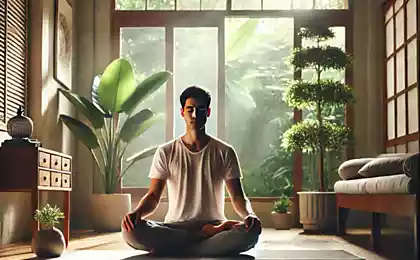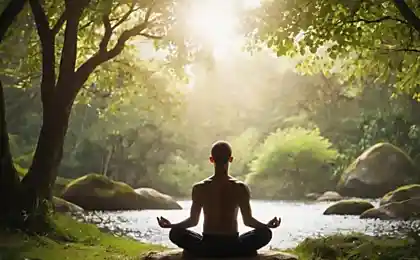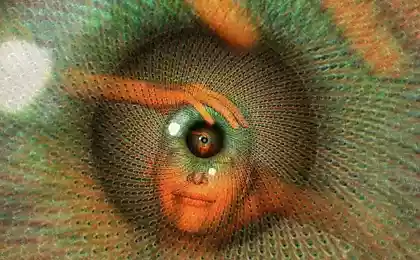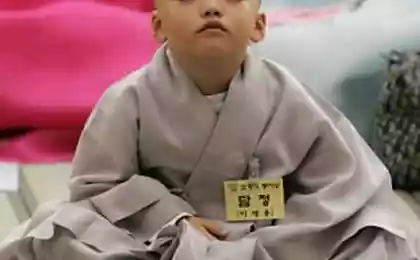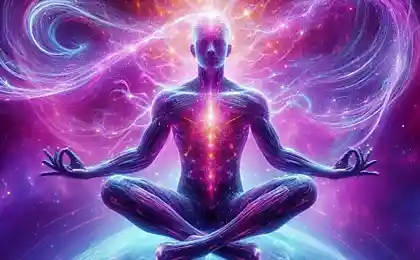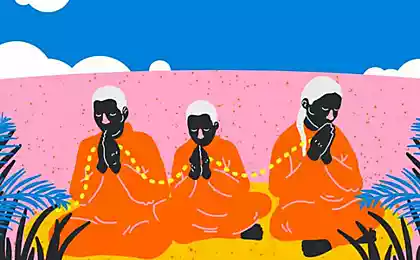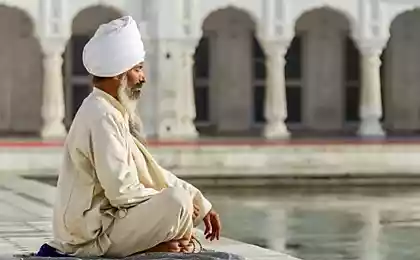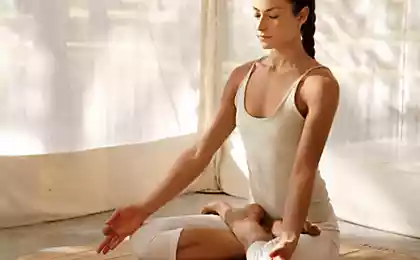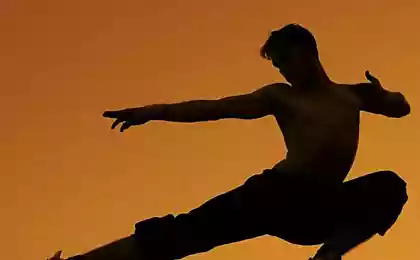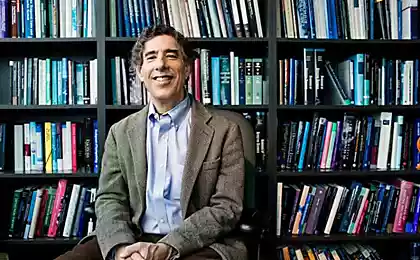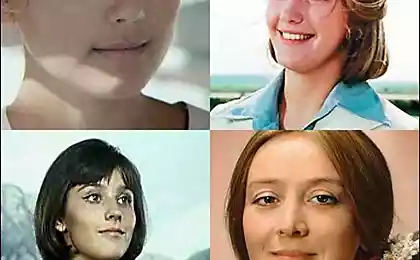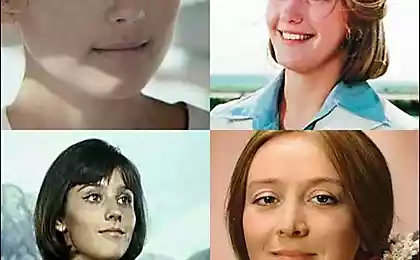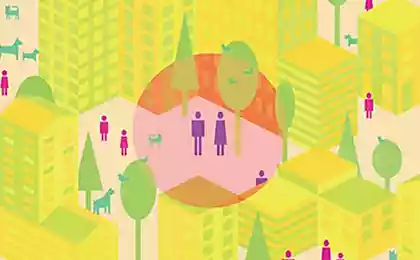545
To live in the present and not false this is the main practice
Our interview with Victor Shiryaev, a meditation instructor, a teacher of a system of basic care (Basic Mindfulness), a specialist in the field of integrated approach to adult life.
Recently took an online summit on mindfulness (mindfulness practices) — excellent project, in my opinion, but here is what was noticed. On the one hand, it's great that the practice of mindfulness becomes mainstream. Talk about it, write, tell, including in relation to business, leadership, health, but the main message — in the context of what You will gain if you start to meditate. That is, the emphasis is still going to receive. How's that for PC?
Great question, and it is largely linked with the consumer society and the vulgarization, in which we now live. On the other hand, I think a few thousand years ago, the situation was not particularly different from the present, and just as now, were engaged in transformative spiritual practice seriously and with understanding, and there were those that went to the temple to offer the offerings "just in case". So, although I would like to see the distribution of more deep and genuine spirituality, I am aware that with the increasing coverage depth is inevitably lost.

In my work I try to balance on the edge without drifting into overt populism and pop music, but at the same time write about the fact that the practice of mindfulness, according to research, has a positive effect on the immune system and pressure, why not?
There are two levels of practices: personal and transpersonal. Personal level does not go beyond the needs of the individual: health, comfort, relaxation, pleasure and so on. And it's perfect! What's wrong with conscious eating, chocolate brownie, if it brings a lot more fun than an unconscious ingestion of cake in a state of confusion in mind?
However, if practice is done correctly, it really reveals a dimension not quite fit into the narrow-minded view about the pleasure and happiness. It really points to the transpersonal dimension in which our perception of ourselves, life, time, pleasure and happiness, almost a mirror opposite of the narrow-minded view about all of this.
And yet, because the practices themselves were not designed in order to improve worldly life. And in the perception of the person who hears about all the bonuses of meditation is delayed that it, it will make his life easier, more colorful, happier. But is it?
Yes and no. Depends on what we mean by improving the lives (which brings us back to the previous question).
In different spiritual traditions, the root motivation was different. I think all motivation, ultimately, can be reduced to two: the search for happiness and the search for meaning/truth. For example, for early Buddhism the search for truth and "how actually things work" had only utilitarian value — as much as this discovery could lead to happiness. The main emphasis was on understanding and eliminating adversity. Whether the ordinary life of complete eradication of misery? Definitely improves, though not as ordinary people imagine.
Well, once I have several times used the word "Philistine" — note that it is not mean that nothing negative or derogatory. Babbitt is a man of the world, interests, needs and meanings which do not go beyond personal biography. However, when the classic spiritual practices (yogi) just refuses to personal biography, it is also extreme. The most interesting question for me is how it is possible to combine the existence in the world and over the world. How they can interpenetrate each other, nurture each other, to speak with one another.
I was also concerned about that balance, interpenetration and complementarity. And here's what emerged... what do you think is the trigger mechanism that initiates the change of motivation? When a person ceases to be a "Philistine" (in the context which you described) and goes to the Call of something greater, transpersonal? Whether it is the destruction of false worldly hopes that changes his perspective, allowing you to see more? And why, when it comes to this Call, he goes to the other extreme rejects and refuses everything that was valuable before? Is it possible to avoid these extremes?
Of course! I'm sure extremes can be avoided. At least, just awareness. As a maximum, integral awareness.
We have, however, and with the psychological awareness of the situation is not very good, frankly, what can we say about the spiritual. American philosopher Ken Wilber this subject explores in his book "Integral spirituality", where offers, among other things, the idea of a "conveyor belt" of religions, when a person gradually is carried out on various aspects of the spiritual path according to his psychological levels of maturity. On one level, baby, it's magic and believing in fairy tales, on the other —the worship of the gods and heroes, the third — the rational critical thinking of oneself and the world, and the beginning of self-inquiry, the fourth — nadnatsionalnoj and deep mysticism, and so on.
In this case the person knows in advance that there are, say, Dark night of the soul, there is a crisis on the Way, there are zero meanings, this is all normal and natural, as of course we first learn to walk, then to read...
The integrated awareness involves the combination of psychology and spirituality, the Union of these two paths — in the world and over the world — which in fact has always been the same Way.
In General, all this will become a reality in a time when psychodoughboy education will become a part of our culture. I hope humanity will survive to this stage.
What is a trigger... don't know. And no one knows. For someone that's understanding, that he did not live its values, and the values of the parents. For another, indeed, a serious loss and suffering in life. For the third boredom, loss of drive. For the fourth interest, the curiosity, the desire to get to the bottom. This, incidentally, was my main motive.
About awareness: just recently attended a lecture where the main thesis (which I loved!) it was just the fact that it is not the changes and growth, and access to what is already present now. On the example of a tree whose roots are hidden under the ground, but they are. Well, what we can't see them? They are. Similarly, as is the foliage, crown, and trunk. It's all there.
That is not the case that the roots become crown or the fruit, and that Tree could "come true"– the feeling of being a tree in one piece. In this context, the awareness gives you the full picture and pushing for a living study. And Yes, I mean that what you're doing, seems to me very valuable. Tell me, who are the people who appeal to you? What they apply, and to whom they appeal: to the meditation instructor? Coach? Therapy? Who you see yourself?
Someone I can see? You know, it very much depends on the context and it's quite difficult to explain. I see myself as a multitude of voices and manifestations, depending on the situation. The task of the "path of purification" as it was formulated by the ancient practitioner, is that the polyphony of voices was, first, aligned and consistent, and secondly, that these voices expressed the most sincere and valuable in them is, that through them might come. Therefore, "see" I'm a man, a teacher. You know yourself, you feel sometimes a man, sometimes conscious of a void, and sometimes the Source, sometimes it will, sometimes son, sometimes a teacher, sometimes a husband, other, person, animal, creativity... bring out all these facets, aspire to their purity and goodness.
And who and what appeals to me... Very different, because I try how to balance on two chairs, while engaged in applied aspects of mindfulness practices and psychology (recently I became interested in therapy-making and responsibility, is very close to me direction, I pass now training program), and on the other hand, a lot of talk about the spiritual path.
What motivates you to do what you do? If you take a narrow segment of what you taught in Kyiv, the algorithm works with the pain — it is applicable in various contexts, and here everything is clear. But this is only a small piece of what you work for.
In a broad sense — nothing motivates me, I have no choice. But in General, I do what I wonder what I can learn myself. Thank God, now have the opportunity on your job to earn a living.
Well, in a narrow sense, my motivation is that the body and mind soon, one way or another, will cease to exist, and therefore, it makes sense to have time to realize all the things unique that through me may occur. However, in the first and in the second sense, the motivation to do exactly what I do, is the desire to point out the truth, maturity and freedom.
Please tell me how you see the relationship teacher-pupil on the spiritual path? One for you, Shinzen young? In some traditions, the aspect of trust and surrender to the teacher is the key, and requires dedication for transmission. Other trends that have not been given any special meaning...
I never had one teacher that I would be devoted entirely and without reserve. In a sense, I envy those people who found their Teacher, it is rare in our world, I think. I learn from everything I aprikose life, relying solely on himself. I have trust in oneself. Here I feel closer to rannemezozoiskie the principles according to which each of us inside and outside has everything you need for a successful practice. However, I do not exclude the possibility that at some point meeting his Teacher, why not? Let's wait and see!
And Sintrom I have interesting going on. At first he was more "technology of meditation". In fact, he himself about and calls. Well, coach, technologist, instructor. So I just took him from working equipment, learned their right to practice and pass on. But with practice, I began to understand more deeply what they really are laid, and every year it causes more trust and respect for the teacher who formulated them. So, for about a year at events, I boldly say, "my teacher, Shinzen", although a couple of years ago me would have jarred. Yes, he is my teacher, without delivery, without the dedication, without the rituals and gear. I don't need his "Dharma seal" to watch "eye of Dharma".
If right now in front of you sat a person who is in the maelstrom of suffering, which so strongly believes in their thoughts that is not able to sit quietly and observe your thoughts, feelings, emotions... What exactly would your steps as the instructor of meditation?
Great question! Let's start with the fact that for any job should be request. If a person is comfortable in their misery, or if he lacks maturity and responsibility — I write a lot about this — in order to want from this maelstrom to swim, then I won't intrude. Against the will of a happy man will not do.
Well, suppose the query is. Then I would start with clarifying goals and values. Why did you come to me? What you really want? In what appears restless dissatisfaction with your life? You need to determine all of this, so the motivation to practice was as transparent as possible.
Further, and this is the third step, and yet there is still nothing about meditation, I would have said, as a practice of consciousness and return attention to the present can help this man get rid of his unique and restless dissatisfaction (or make so that it did not charge for his actions and had no effect on his condition). For Westerners it is very important to first establish a cognitive understanding of the practice. In the East, the student often years repeats after teacher (for example, movements in kung fu), I did not really understand what he's doing and why, saves questions. In the West, so will not work. Who am I to believe without question (to the previous question about the Teacher)? To start practicing Westerner needs to understand what it's for, how it works and what exactly to do. We have the same individualism — every man for himself. Works well appeal to science, because when "scientists from Harvard have proved" that belief in it becomes more. Well, to psychology, when examples from the life of a person can be quite easy to show why the usual strategies of behavior and thinking do not work or work poorly. And after all this, after we have carefully determined that this person really wants and why, what his values and goals, and for which he practice of mindfulness, I can already start to offer some concrete strategies and techniques.
Suppose that a person who is already largely successful. Or held, realized, but this happiness it brings, and he realizes quite clearly that happiness has nothing to do with external circumstances. People, faced with the fact that there is no hope for "someday in the beautiful far" he has no... What then? I understand that model some abstract way, and much, perhaps everything, depends entirely on who is actually in front of you, and what is happening in this unique collaboration. But still. And... if you've Had that you refused to work with the person?
You know, although it's of course very abstract, and it is necessary to specifically feel the person who sits in front of you, but these people talking to me, of course. I would even say it's a pretty classic type. If again to talk about a certain pattern of cooperation, in the first place is the clarification of values. Not meditation. Always on the first place sense. That is, happiness brings... what brings? What is the most important thing in life? What is the main? There are many tools for clarifying values. Next is a contemplative practice can be used as a way of implementing these values in life.
And no, I haven't refused to work with anyone. Rather, some people had dropped out after 1-2 sessions. This is perfectly normal.
And finally, I want to ask you: what is your favorite practice? Of all the techniques that you teach that you studied, what for you is the most natural expression of the essence of the Practice and manifestation of this fact?
I guess you could say this: the most important practice, the most important technique is to live this life. To live it truly. To live in the present. Not afraid of death. Without fear of relations. Not fearing the world. Not afraid of self-expression. Not chasing after consumption. In the active presence, where presence is the fullness of life in the present, and the activity is a conscious action from the space of infinite clarity, joy, openness and love.
Any technology is just an aid that a little deeper to learn one of the facets of life. Someone, you need to understand that "there is no I", and someone-"I have everything." But the essence remains the same: it gives a special quality of life that is confused.
I am not this body, but I appear as a body. I am not these thoughts, but I manifest as thoughts. I am not these feelings and emotions, but I manifest as feelings and emotions. I have a life. I have the freedom. There is nothing but me. How can I be afraid of living? How can I be afraid of a relationship? Who am I who is afraid? Who suffers? Which tenses? Who cares?
Lying at deaths door, what will I remember? How could not say what he wanted? That did something out of fear? Not live my life because constantly running away from her?
To live in the present and not false this is the main practice.published
Author Victor Shiryaev
Interviewed By Annie Petrosyan
P. S. And remember, just changing your mind — together we change the world! © Join us at Facebook , Vkontakte, Odnoklassniki
Source: 9journal.com.ua/%D0%B6%D0%B8%D1%82%D1%8C-%D0%BD%D0%B0%D1%81%D1%82%D0%BE%D1%8F%D1%89%D0%B8%D0%BC-%D0%B0-%D0%BD%D0%B5-%D0%BB%D0%BE%D0%B6%D0%BD%D1%8B%D0%BC/
Recently took an online summit on mindfulness (mindfulness practices) — excellent project, in my opinion, but here is what was noticed. On the one hand, it's great that the practice of mindfulness becomes mainstream. Talk about it, write, tell, including in relation to business, leadership, health, but the main message — in the context of what You will gain if you start to meditate. That is, the emphasis is still going to receive. How's that for PC?
Great question, and it is largely linked with the consumer society and the vulgarization, in which we now live. On the other hand, I think a few thousand years ago, the situation was not particularly different from the present, and just as now, were engaged in transformative spiritual practice seriously and with understanding, and there were those that went to the temple to offer the offerings "just in case". So, although I would like to see the distribution of more deep and genuine spirituality, I am aware that with the increasing coverage depth is inevitably lost.

In my work I try to balance on the edge without drifting into overt populism and pop music, but at the same time write about the fact that the practice of mindfulness, according to research, has a positive effect on the immune system and pressure, why not?
There are two levels of practices: personal and transpersonal. Personal level does not go beyond the needs of the individual: health, comfort, relaxation, pleasure and so on. And it's perfect! What's wrong with conscious eating, chocolate brownie, if it brings a lot more fun than an unconscious ingestion of cake in a state of confusion in mind?
However, if practice is done correctly, it really reveals a dimension not quite fit into the narrow-minded view about the pleasure and happiness. It really points to the transpersonal dimension in which our perception of ourselves, life, time, pleasure and happiness, almost a mirror opposite of the narrow-minded view about all of this.
And yet, because the practices themselves were not designed in order to improve worldly life. And in the perception of the person who hears about all the bonuses of meditation is delayed that it, it will make his life easier, more colorful, happier. But is it?
Yes and no. Depends on what we mean by improving the lives (which brings us back to the previous question).
In different spiritual traditions, the root motivation was different. I think all motivation, ultimately, can be reduced to two: the search for happiness and the search for meaning/truth. For example, for early Buddhism the search for truth and "how actually things work" had only utilitarian value — as much as this discovery could lead to happiness. The main emphasis was on understanding and eliminating adversity. Whether the ordinary life of complete eradication of misery? Definitely improves, though not as ordinary people imagine.
Well, once I have several times used the word "Philistine" — note that it is not mean that nothing negative or derogatory. Babbitt is a man of the world, interests, needs and meanings which do not go beyond personal biography. However, when the classic spiritual practices (yogi) just refuses to personal biography, it is also extreme. The most interesting question for me is how it is possible to combine the existence in the world and over the world. How they can interpenetrate each other, nurture each other, to speak with one another.
I was also concerned about that balance, interpenetration and complementarity. And here's what emerged... what do you think is the trigger mechanism that initiates the change of motivation? When a person ceases to be a "Philistine" (in the context which you described) and goes to the Call of something greater, transpersonal? Whether it is the destruction of false worldly hopes that changes his perspective, allowing you to see more? And why, when it comes to this Call, he goes to the other extreme rejects and refuses everything that was valuable before? Is it possible to avoid these extremes?
Of course! I'm sure extremes can be avoided. At least, just awareness. As a maximum, integral awareness.
We have, however, and with the psychological awareness of the situation is not very good, frankly, what can we say about the spiritual. American philosopher Ken Wilber this subject explores in his book "Integral spirituality", where offers, among other things, the idea of a "conveyor belt" of religions, when a person gradually is carried out on various aspects of the spiritual path according to his psychological levels of maturity. On one level, baby, it's magic and believing in fairy tales, on the other —the worship of the gods and heroes, the third — the rational critical thinking of oneself and the world, and the beginning of self-inquiry, the fourth — nadnatsionalnoj and deep mysticism, and so on.
In this case the person knows in advance that there are, say, Dark night of the soul, there is a crisis on the Way, there are zero meanings, this is all normal and natural, as of course we first learn to walk, then to read...
The integrated awareness involves the combination of psychology and spirituality, the Union of these two paths — in the world and over the world — which in fact has always been the same Way.
In General, all this will become a reality in a time when psychodoughboy education will become a part of our culture. I hope humanity will survive to this stage.
What is a trigger... don't know. And no one knows. For someone that's understanding, that he did not live its values, and the values of the parents. For another, indeed, a serious loss and suffering in life. For the third boredom, loss of drive. For the fourth interest, the curiosity, the desire to get to the bottom. This, incidentally, was my main motive.
About awareness: just recently attended a lecture where the main thesis (which I loved!) it was just the fact that it is not the changes and growth, and access to what is already present now. On the example of a tree whose roots are hidden under the ground, but they are. Well, what we can't see them? They are. Similarly, as is the foliage, crown, and trunk. It's all there.
That is not the case that the roots become crown or the fruit, and that Tree could "come true"– the feeling of being a tree in one piece. In this context, the awareness gives you the full picture and pushing for a living study. And Yes, I mean that what you're doing, seems to me very valuable. Tell me, who are the people who appeal to you? What they apply, and to whom they appeal: to the meditation instructor? Coach? Therapy? Who you see yourself?
Someone I can see? You know, it very much depends on the context and it's quite difficult to explain. I see myself as a multitude of voices and manifestations, depending on the situation. The task of the "path of purification" as it was formulated by the ancient practitioner, is that the polyphony of voices was, first, aligned and consistent, and secondly, that these voices expressed the most sincere and valuable in them is, that through them might come. Therefore, "see" I'm a man, a teacher. You know yourself, you feel sometimes a man, sometimes conscious of a void, and sometimes the Source, sometimes it will, sometimes son, sometimes a teacher, sometimes a husband, other, person, animal, creativity... bring out all these facets, aspire to their purity and goodness.
And who and what appeals to me... Very different, because I try how to balance on two chairs, while engaged in applied aspects of mindfulness practices and psychology (recently I became interested in therapy-making and responsibility, is very close to me direction, I pass now training program), and on the other hand, a lot of talk about the spiritual path.
What motivates you to do what you do? If you take a narrow segment of what you taught in Kyiv, the algorithm works with the pain — it is applicable in various contexts, and here everything is clear. But this is only a small piece of what you work for.
In a broad sense — nothing motivates me, I have no choice. But in General, I do what I wonder what I can learn myself. Thank God, now have the opportunity on your job to earn a living.
Well, in a narrow sense, my motivation is that the body and mind soon, one way or another, will cease to exist, and therefore, it makes sense to have time to realize all the things unique that through me may occur. However, in the first and in the second sense, the motivation to do exactly what I do, is the desire to point out the truth, maturity and freedom.
Please tell me how you see the relationship teacher-pupil on the spiritual path? One for you, Shinzen young? In some traditions, the aspect of trust and surrender to the teacher is the key, and requires dedication for transmission. Other trends that have not been given any special meaning...
I never had one teacher that I would be devoted entirely and without reserve. In a sense, I envy those people who found their Teacher, it is rare in our world, I think. I learn from everything I aprikose life, relying solely on himself. I have trust in oneself. Here I feel closer to rannemezozoiskie the principles according to which each of us inside and outside has everything you need for a successful practice. However, I do not exclude the possibility that at some point meeting his Teacher, why not? Let's wait and see!
And Sintrom I have interesting going on. At first he was more "technology of meditation". In fact, he himself about and calls. Well, coach, technologist, instructor. So I just took him from working equipment, learned their right to practice and pass on. But with practice, I began to understand more deeply what they really are laid, and every year it causes more trust and respect for the teacher who formulated them. So, for about a year at events, I boldly say, "my teacher, Shinzen", although a couple of years ago me would have jarred. Yes, he is my teacher, without delivery, without the dedication, without the rituals and gear. I don't need his "Dharma seal" to watch "eye of Dharma".
If right now in front of you sat a person who is in the maelstrom of suffering, which so strongly believes in their thoughts that is not able to sit quietly and observe your thoughts, feelings, emotions... What exactly would your steps as the instructor of meditation?
Great question! Let's start with the fact that for any job should be request. If a person is comfortable in their misery, or if he lacks maturity and responsibility — I write a lot about this — in order to want from this maelstrom to swim, then I won't intrude. Against the will of a happy man will not do.
Well, suppose the query is. Then I would start with clarifying goals and values. Why did you come to me? What you really want? In what appears restless dissatisfaction with your life? You need to determine all of this, so the motivation to practice was as transparent as possible.
Further, and this is the third step, and yet there is still nothing about meditation, I would have said, as a practice of consciousness and return attention to the present can help this man get rid of his unique and restless dissatisfaction (or make so that it did not charge for his actions and had no effect on his condition). For Westerners it is very important to first establish a cognitive understanding of the practice. In the East, the student often years repeats after teacher (for example, movements in kung fu), I did not really understand what he's doing and why, saves questions. In the West, so will not work. Who am I to believe without question (to the previous question about the Teacher)? To start practicing Westerner needs to understand what it's for, how it works and what exactly to do. We have the same individualism — every man for himself. Works well appeal to science, because when "scientists from Harvard have proved" that belief in it becomes more. Well, to psychology, when examples from the life of a person can be quite easy to show why the usual strategies of behavior and thinking do not work or work poorly. And after all this, after we have carefully determined that this person really wants and why, what his values and goals, and for which he practice of mindfulness, I can already start to offer some concrete strategies and techniques.
Suppose that a person who is already largely successful. Or held, realized, but this happiness it brings, and he realizes quite clearly that happiness has nothing to do with external circumstances. People, faced with the fact that there is no hope for "someday in the beautiful far" he has no... What then? I understand that model some abstract way, and much, perhaps everything, depends entirely on who is actually in front of you, and what is happening in this unique collaboration. But still. And... if you've Had that you refused to work with the person?
You know, although it's of course very abstract, and it is necessary to specifically feel the person who sits in front of you, but these people talking to me, of course. I would even say it's a pretty classic type. If again to talk about a certain pattern of cooperation, in the first place is the clarification of values. Not meditation. Always on the first place sense. That is, happiness brings... what brings? What is the most important thing in life? What is the main? There are many tools for clarifying values. Next is a contemplative practice can be used as a way of implementing these values in life.
And no, I haven't refused to work with anyone. Rather, some people had dropped out after 1-2 sessions. This is perfectly normal.
And finally, I want to ask you: what is your favorite practice? Of all the techniques that you teach that you studied, what for you is the most natural expression of the essence of the Practice and manifestation of this fact?
I guess you could say this: the most important practice, the most important technique is to live this life. To live it truly. To live in the present. Not afraid of death. Without fear of relations. Not fearing the world. Not afraid of self-expression. Not chasing after consumption. In the active presence, where presence is the fullness of life in the present, and the activity is a conscious action from the space of infinite clarity, joy, openness and love.
Any technology is just an aid that a little deeper to learn one of the facets of life. Someone, you need to understand that "there is no I", and someone-"I have everything." But the essence remains the same: it gives a special quality of life that is confused.
I am not this body, but I appear as a body. I am not these thoughts, but I manifest as thoughts. I am not these feelings and emotions, but I manifest as feelings and emotions. I have a life. I have the freedom. There is nothing but me. How can I be afraid of living? How can I be afraid of a relationship? Who am I who is afraid? Who suffers? Which tenses? Who cares?
Lying at deaths door, what will I remember? How could not say what he wanted? That did something out of fear? Not live my life because constantly running away from her?
To live in the present and not false this is the main practice.published
Author Victor Shiryaev
Interviewed By Annie Petrosyan
P. S. And remember, just changing your mind — together we change the world! © Join us at Facebook , Vkontakte, Odnoklassniki
Source: 9journal.com.ua/%D0%B6%D0%B8%D1%82%D1%8C-%D0%BD%D0%B0%D1%81%D1%82%D0%BE%D1%8F%D1%89%D0%B8%D0%BC-%D0%B0-%D0%BD%D0%B5-%D0%BB%D0%BE%D0%B6%D0%BD%D1%8B%D0%BC/
